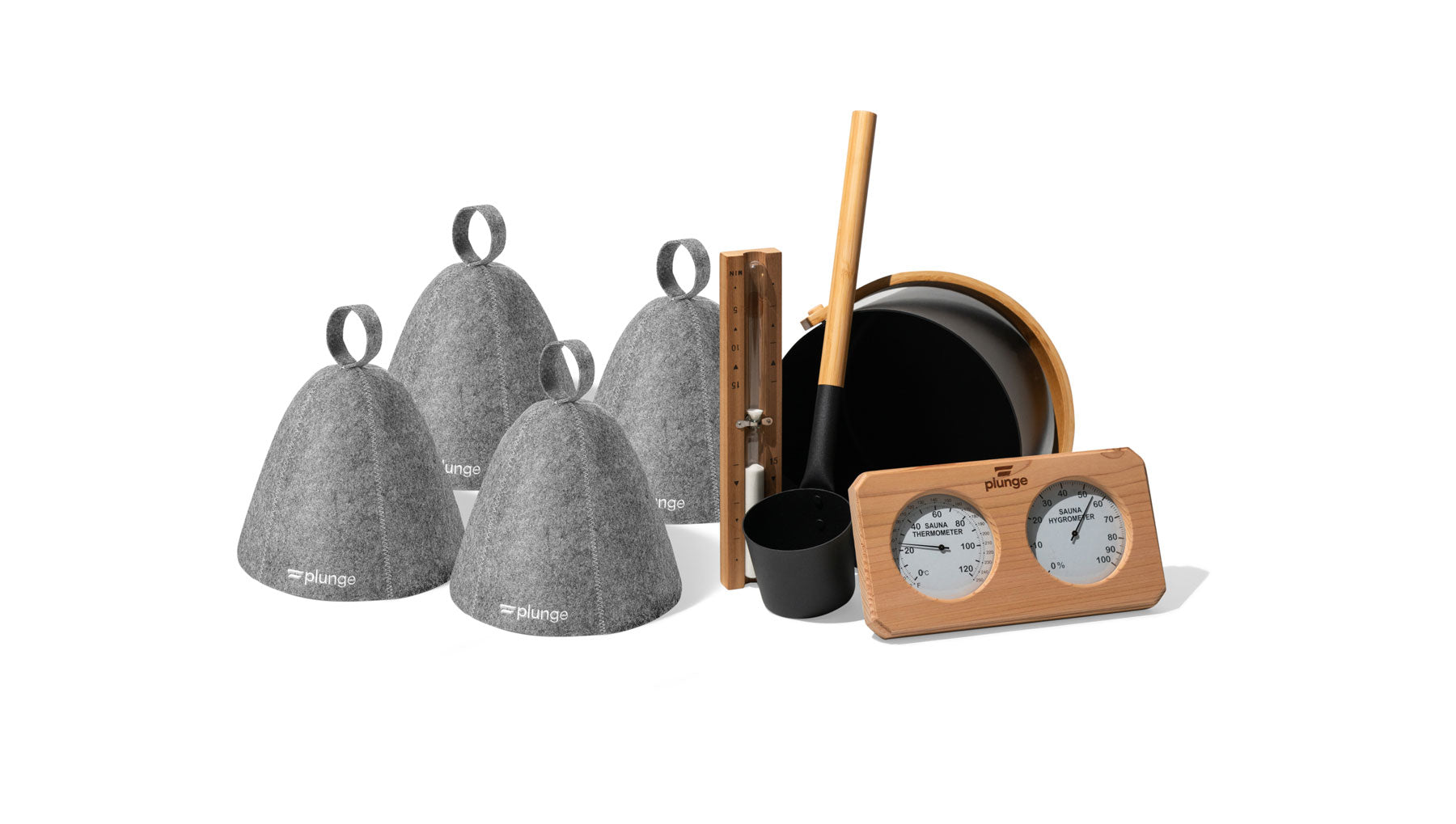
Mental Health Benefits of Ice Baths: Reduce Stress & Boost Your Mood
If you are looking for ways to improve your mental health, you may want to consider taking an ice bath. As you probably know, there are many physical benefits to ice baths, such as improved circulation, reduced inflammation, and decreased muscle soreness. But did you know that cold water therapy can also improve your mental health?
In this post, we’ll tell you all about the mental health benefits of ice baths and give you the scientific breakdown behind it.
How Stress Affects Your Mind & Body
Stress is a strong force. According to the American Psychological Association, when you feel stressed out or anxious, several damaging things can happen to your body and brain:
- Muscle Tension: This is your body’s way of protecting itself from injuries and pain. Excessive muscle tension can lead to chronic stress if your muscles stay triggered over a long period. Stress can also lead to migraine headaches, which can develop from chronic muscle tension in your shoulders, head, and neck.
- Respiratory Challenges: In addition to muscle tension, stress can cause shortness of breath and rapid breathing as your airways become constricted. For people with diseases and conditions like respiratory disease, panic attacks, and asthma, stress can bring on dangerous breathing challenges and trigger attacks.
- Increases Your Heart Rate: It can affect your cardiovascular system, causing an increase in your heart rate as the hormones associated with stress (cortisol, adrenaline, and noradrenaline) race through your body.
- Dilates Blood Vessels to Your Heart: Stress also makes the blood vessels that direct blood to your heart dilate. This is your typical fight or flight response, and it's your body’s way of preparing you to either “fight” or “fly away” from the stressor. Too much of this over time can lead to an increased risk of heart attack or stroke.
Feeling stressed reading about stress? Don’t worry! This is where cold plunging comes in.
Ice Bath Benefits for Mental Health
Dipping yourself in cold water to improve your mental health may sound a bit unreal at first, but it works as a supplement to other treatments. There are many mental health benefits with ice baths that you can experience, such as:
- Alleviate depression and anxiety
- Improve your mood and reduce stress
- Improve general brain function
- Build stress resilience
Alleviate Depression and Anxiety
Anxiety and depression are two of the most common mental health disorders, affecting millions of people around the world. Using cold water therapy for anxiety has been shown to be an effective supplemental treatment for both conditions by decreasing the stress hormone cortisol (which we’ll talk more about later).
Studies have shown that those with depression who take regular cold baths had a significant improvement in their symptoms compared to those who did not take cold baths. The mental benefits of ice baths for anxiety and depression were so great that the participants continued to experience improvements even after they stopped plunging. Another study found that regular cold showers and ice baths helped reduce anxiety and improve the mood of participants.
Improve Your Mood and Reduce Stress
After the initial “shock” of stepping into an ice-cold tub of water, many people experience an elevated mood. This is likely due to the release of endorphins, hormones that act as natural painkillers, which have been shown to improve mood and reduce stress.
A study conducted in 2001 examined the hormonal changes of cold water swimmers over time, finding a strong decrease in cortisol (the stress hormone) and better adaptation to the “flight or fight” response in the body. Put simply, extended time in cold water helped these athletes adapt to stressful situations and allowed them to be calmer and more relaxed as time went on!
Improve General Brain Function
Taking regular ice baths can help improve your focus, concentration, and overall cognitive performance. When cold water shocks your body, your brain produces norepinephrine, a neurotransmitter and hormone, which helps you gain better focus and attention. Norepinephrine also plays a role in regulating your emotions.

Depleted levels of norepinephrine are said to play a significant role in causing lack of energy, lack of concentration, and even ADHD and depression. Since ice bathing has been shown to increase norepinephrine production, it’s worth exploring not only as a stress reliever but also as a way to improve general brain function.
Build Stress Resilience
While ice baths reduce stress in the short-term, they can also make you more resilient to stress in the long-run. This is because it regulates the release of stress hormones long-term.
Like exercise makes your body stronger, cold plunging acts in a similar way to build your body’s resiliency. A leading researcher in cold water swimming, Professor Mike Tipton, found that cold water swimmers had a better adaptation to their bodies’ “fight-or-flight” response, with decreased levels of cortisol — your body’s main stress hormone. He explains that by exposing one’s body to the controlled stress of cold water repeatedly over time, you adapt to react less to the shock of the cold water while also adapting to react less to stress long-term.
Also, a study found that cold water swimmers were able to handle the cold more easily the more they plunged into cold waters. This short-term voluntary cold exposure resulted in long-term reduction in levels of chemicals that cause oxidative stress and an “increased tolerance to environmental stress.”
Short-Term vs. Long-Term Stress Relief with Cold Water Therapy
However, to reap all of the ice bath mental health benefits, you should build up a daily routine of cold water therapy. Check out this chart below to see the impact of both short and long-term plunging.

The Science Behind How Cold Plunging Improves Your Mental Health
Now that we’ve told you about the mental health benefits of ice baths, you may be wondering how exactly plunging yourself in cold water gives you these benefits. Here’s the science behind its effects.
Upon the first contact with cold water, your blood vessels constrict to bring blood closer to your vital organs. This natural constriction helps keep heat within the body, and it is increased by a hormone and neurotransmitter called norepinephrine. Also known as noradrenaline, this chemical is released when your body is under stress (like being in icy water), increasing the constriction of your blood vessels. When you leave the cold, your body naturally reheats, reopening those blood vessels, and improving circulation and blood flow.
Cold Water Regulates Your Hormones
Cold water therapy regulates the release of hormones, which is important because hormone imbalances can lead to a variety of health problems, such as anxiety, depression, and weight gain. Overall, ice baths affect your hormones by:
- Reducing cortisol - the stress hormone
- Increasing endorphins - a natural painkiller
- Increasing norepinephrine - regulates emotions and boosts focus
In one study, participants who took cold showers had a significant decrease in cortisol levels compared to those who took hot showers. This decrease in cortisol is why ice baths can improve your mood and alleviate anxiety and depression.
Cold Water Calms the Vagus Nerve
The vagus nerve is a long nerve that runs from your brain to your stomach. It's responsible for a variety of functions, such as controlling your heart rate, blood pressure, and stress response. When you're stressed, the vagus nerve signals your body to release stress hormones.
When you take an ice bath, the cold water has a calming effect that activates the vagus nerve to decrease stress levels and to help reduce tension and anxiety.
Ready to Try an Ice Bath at Home?
As you can see, there are a lot of ways ice baths can improve your mental health in addition to your physical health. If you're looking to improve your mental health, reduce stress, and become more resilient, consider incorporating regular ice baths into your routine. And if you’re looking for even more benefits, consider creating a routine using both sauna and cold plunging!
Our team here at Plunge has seen the mental benefits of ice baths firsthand and we want to help more people embrace these amazing benefits too! This is why we created the revolutionary Cold Plunge tub, which is great for beginners and enthusiasts alike. Explore our complete line of state-of-the-art cold plunge tubs here, all are available with flexible financing options and plans to work for you.
Medical Disclaimer: The information contained in this post is for informational and educational purposes only. It is not intended to provide medical advice or to take the place of such advice or treatment from a personal physician. All readers/viewers of this content are advised to consult their doctors or qualified health professionals regarding specific health questions or before embarking on any new health or wellness routine, including saunas and cold plunging. Neither the author(s) nor the publisher of this content take responsibility for possible health consequences of any person or persons reading or following the information in this educational content. All viewers of this content, especially those taking prescription or over-the-counter medications, should consult their physicians before beginning any cold plunging routine or other health or wellness program.























